Diminutives (Armory)
WARNING: Do not cite this page as a reference. This page is on this wiki only to make the content "searchable" and easier to find. If you find the information you seek here, go to the original sources as linked below to verify the information and use them for your documentation.
Glossary of Terms:[edit | edit source]
- In names, a name that is derived from another name as a shortened or pet form. Belet, Bibby, Ibbe, Ibbet, Libbe, and Tibota were all period diminutives of Isabel. Some diminutives are actually longer than the original name. For example Jobin is a period diminutive of Job and Josekyn a period diminutive of Joss. [see Diminutive Names ]
- In armory, multiple and (usually) narrower variants of an Ordinaryare said to be diminutives of it. For example, two bars are diminutives of a fess, and two bendlets are diminutives of a bend. SCA armory does not use single diminutives of charges, as they were considered artistic variants of the single ordinary in period.
http://heraldry.sca.org/coagloss.html
Precedents:[edit | edit source]
Precedents of the SCA College of Arms - http://heraldry.sca.org/laurel/precedents.html
Morsulus Heralds Website - http://www.morsulus.org/]] (to search the LoARs and Precedents)
Restatement Wiki - http://yehudaheraldry.com/restatement/index.php?title=Main_Page]] (restatements of Precedents)
Use the above links to be sure any precedents listed below haven't been superseded by newer precedents.
From June 2005 - when a fess can be a bar[edit | edit source]
Emma Barfoot. Device. Sable, a foot couped and in chief a bar argent. "The submitter requested that the fess be blazoned as a bar as a cant on her name. Single diminutives of ordinaries aren't normally blazoned as such. Only if there are multiple diminutives (e.g. three bendlets) or if the charge is otherwise reduced in importance (e.g. a bendlet enhanced) would the diminutive term be used. Because of the cant -- and the enhanced nature of the fess -- we have blazoned it as a bar." Note that this was registered as a diminutive name only because of the cant on "bar foot". Otherwise it would have been registered as a fess. [2005 LoAR]
September 1997 - single diminutives unregisterable[edit | edit source]
"This is being returned for a redraw. We don't register single diminutives of ordinaries, and this is far too narrow to be a bend." September 1997 LoAR
September 1994 = bend drawn unacceptably narrow[edit | edit source]
"However, in this case, the bend is, in fact, drawn unacceptably narrow (indeed, I suspect modern heralds would blazon it as a "ribband" or some such; it is certainly narrower than a bendlet. It needs to be redrawn thicker)." The device was returned.September 1994 LoAR
June 1990 - no difference between ordinary and its diminutive[edit | edit source]
"there is no difference between an ordinary and its diminutive" June 1990 LoAR
Heraldry Primer[edit | edit source]
Diminutives - http://heraldry.sca.org/primer/variants.html#diminutive (now defunct)
Diminutives are thinner, smaller versions of the ordinaries. Diminutives are not registered in SCA heraldry. However, their usage is common enough in mundane heraldry to warrant mention here. The bar is a diminutive of the fess, in that the bar is a narrower version of the fess. Other ordinaries have their own diminutives. The diminutive of a pale is a palet. The diminutive of a bend is a bendlet. The diminutive of a bend sinister is a scarpe. The diminutive of an orle is a tressure. And so on.
Sable, a fess argent. 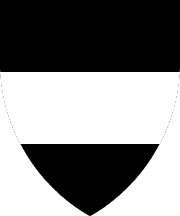
|
Sable, a bar argent.  |
Sable, a pale argent. 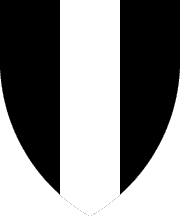
|
Sable, a palet argent. 
| ||
Sable, a bend argent. 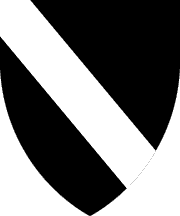
|
Sable, a bendlet argent.  |
Sable, a bend sinister argent. 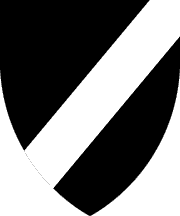
|
Sable, a scarpe argent.  |
||
Sable, an orle argent. 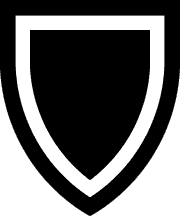
|
Sable, a tressure argent. 
|